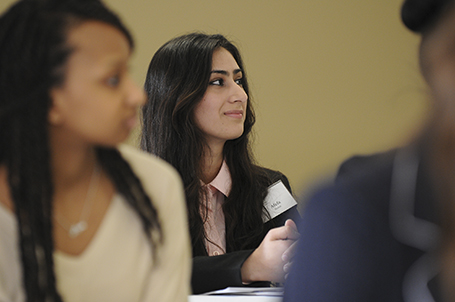Monday, Mar 3, 2014
The School of Liberal Arts hosted a weeklong event for science majors intent on building successful careers
by Adam Grybowski
Briana Lettsome ’16 knew she wanted to work in government. But doing what? Looking for direction, the biochemistry major attended the Science Career Bootcamp hosted by Rider University’s College of Liberal Arts and Sciences this past January.
Dr. Laura Hyatt, associate dean of the College of Liberal Arts and Sciences, and Gary Nath ’66, owner of the Nath Law Group and chair of the University’s Science Advisory Board, worked together to create the bootcamp as a way to help students like Lettsome choose a career, land a job and understand the expectations of professional behavior.
When Briana asked Hyatt and Nath for direction, they recommended she consider the Centers for Disease Control as a viable option. From that conversation, Lettsome shaped her vague notion of a possible career into a specific goal. “I had an idea, but no way to put a name to it,” she says. Now she’s determined to work as an epidemiologist for the CDC.
The weeklong bootcamp — the first of its kind at Rider — was split into morning and afternoon sessions, with lunch and presentations in between. Hyatt and Nath worked with Kevin Fallon, Lauren Nicolosi and others from Rider's Office of Career Services to develop the presentations. They also tapped members of the Science Advisory Board and other volunteers from around the University. “All of our participants were thrilled to contribute their expertise as it related to the real world environment,” says Nath, whose own experience speaks to the need for business skills no matter what your major.
“As a Rider science graduate, I have been extremely successful in sharing and selling my experiences and scientific background to others,” he says. “However, I was deficient in soft skills, such as effective verbal and written communication skills, and was not really sure what to do when I graduated.”
Jonathan Millen, associate dean for the liberal arts, spoke about effective public speaking and presentations. Mark Kasrel, executive in residence and Harper Professor, discussed nonverbal communication. Joyce Tyler of Career Services gave a presentation on professional attire. Students received information on career opportunities in the United States and abroad, as well as in the private and public sectors. Steve Bell ’79, CEO of the oil and gas company Casa Exploration, discussed geological careers. Helen Eldgridge ’76, Len Jokubaitis and Peter Tolias discussed healthcare. Internships and graduate school opportunities were also addressed.
Although Lettsome speaks confidently about the direction of her career, she says the event revealed the variety of options a science education holds. “I figured if you’re a science major, you automatically go into the sciences,” she says. “This opened my eyes that you can go into business or into law if you decide that you don’t want to go work in a lab.”
Alex Dorosheva ’15, who’s majoring in biochemistry and minoring in law and justice, hopes to attend graduate and law school after Rider. Her goal is to combine her passion for science and law to become a patents lawyer. Before the event, “I wasn’t 100 percent sure if that was what I wanted to do,” she says. “I never met anyone before who was a patents lawyer. Once I met Mr. Nath, I was reassured that you can go in that direction.” At the event, Nath, whose practice focuses on intellectual property, invited her to visit his office to learn more about the field.
Feedback on the event gives a picture of students with a passion for science, a love of learning, and a desire to help others and make a difference. But those same students often possess an incomplete picture of what it takes to find a good job beyond earning a degree — the importance of networking, acting professionally and thinking broadly about career opportunities.
While focused on helping students, the event also served board members eager to give back. “It does scratch the itch for those who want to meet students and share their knowledge with them,” Hyatt says. “It not only helps students, but cements relationships between the alumni and the board. It has both lasting and immediate effects.”

